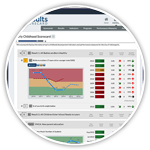It is often true that conversations within the Education community focus so intently on school performance improvement that it is difficult to have a conversation about the Population Accountability dimension of education. This problem is compounded by the fact that many important education measures (such as graduation rate or percent reading at grade level) double for population indicators. (See Chapter 5 of “Trying Hard Is Not Good Enough.”)
So what is the population conversation we should have when it comes to education? I think it is about why we need education in the first place, about the role of education in our society. So why do we need education? The answer has not always been obvious. (It would be interesting to revisit here the work of Noah Webster.) Public education has been such a long accepted part of our society that the basic need for education is rarely questioned. But when we think about first purposes, it seems that education’s role is arguably about (at least) three things: (1) creating good citizens and a civil society, (2) helping young people reach their potential and become happy, productive, contributing adults, and (3) creating our next generation work force and securing our economic future. Each of these three roles lends itself to measurement. (For example, the adult literacy rate or the percentage of young adults in work or education. And in each case, the education system could be clearly seen as one of many partners with a role to play.
Part of the reason I think this conversation is worth having, particularly for those immersed in the day to day management of K-12 (primary/secondary) system, is that it shows that the education system is not responsible for curing the ills of the world. There is such a long history of expecting just this from educators that we forget how unfair that expectation is. By stepping back and thinking about the role of education in society we have a chance to get back to our shared values, to remember why our large monetary investments in education are worth every cent and more, and maybe to begin to re-conceptualize education as more than a set of services but rather a community responsibility for which everyone has something to contribute.



